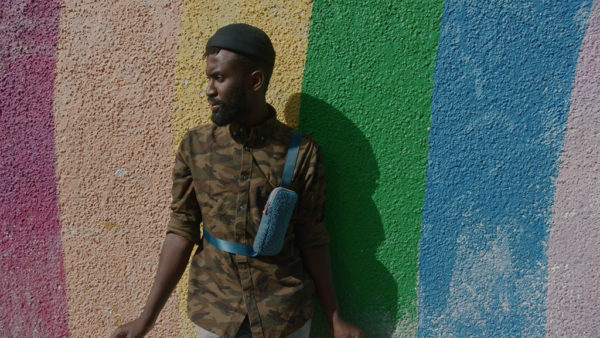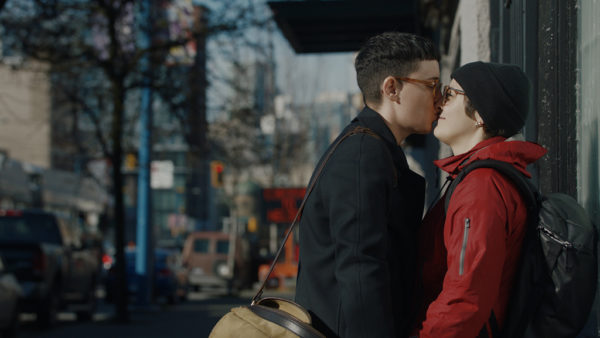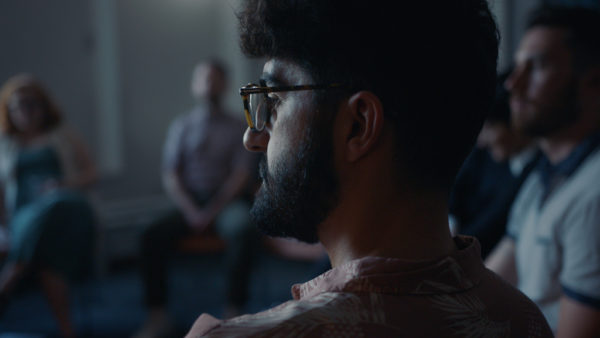
‘Someone Like Me’ portrays a year in the life of a group of LGBTQIA Canadians as they sponsor and support a gay Ugandan refugee in Vancouver, Canada.
The description for Sean Horlor and Steve J. Adams’ documentary hints at its large ambitions: to chronicle an “emotional journey in search of personal freedom, revealing how in a world where one must constantly fight for the right to exist, survival itself becomes a victory.” In this capacity, the documentary endeavours to be both aspirational and empowering, but in reality it is more muddled and familiar.
At issue is the fact that Someone Like Me isn’t entirely about Ugandan refugee Drake, a 22 year old aspiring fashion designer fleeing persecution. Nor is it about the Rainbow Refugee’s “private commitment support group” composed of a group of LGBTQIA strangers and allies who raise money to support Drake for his first year in Canada.
The muddled focus is the result of the doc’s first act, which introduces more than a half dozen characters – a support “circle” – who raise $20k and plan to dedicate the next year of their lives supporting Drake after his arrival in Canada. In addition to the circle members, Horlor and Adams introduce Chris, a former Catholic nun, lesbian and organizer of Rainbow Refugee; Michael, the circle’s mentor within the organization; and Adam, a former refugee, all of whom seemingly will have an important role in Drake’s story moving forward.
Then Drake arrives and within weeks the group fractures over his alcohol and marijuana use. There’s a fascinating discussion among the group members about the nature of their role: some believe they’re exclusively there to support Drake, not police or moralize his behaviour. Others argue that they didn’t sign for the partying. The division ends with nearly everyone in the circle abandoning the project, leaving behind only members Kay and David.

Unfortunately all of this conflict is brief and hastily handled by Horlor and Adams. Ultimately the filmmakers opt to keep the focus of the documentary on Drake and the individuals supporting his transition to Canada. This makes sense, because Drake’s journey is the core component linking them all together; it also reflects the kind of cinema verité the documentary is aiming for (conflict happens, people move in an out of our lives, and we persevere).
Unfortunately the decision also negates the emotional labour of Someone Like Me‘s first act. The audience is asked to invest in the journey of several other circle members, then abandons them without even an exit interview or a follow-up at the end of the film.
As the film progresses, Someone Like Me narrows its focus to consider the individual struggles of Kay and their girlfriend Em, David and his girlfriend Brenda and, finally, Drake himself (A note of significance: each character is introduced with their preferred pronouns, which is exemplary and very reflective of the LGBTQIA community).
Alas the loss of the other circle members and the more straight forward focus on the lives of three key players means that the compelling dialogue about how the prejudices of well-intentioned allies affect the experiences of refugees are lost or reduced to soundbites (usually from Michael, whose eloquence and empathy beg for more screen time). The result is a film that eschews murky topics in favour of a more straightforward (nearly biographical) portrait of three urban queers over the course a year.

In that capacity, Someone Like Me mostly works. Kay’s decision to pursue top surgery is particularly compelling, while David’s inability to find work in an expensive city and Drake’s journey to find community and work feel less fleshed out and more familiar.
The brief 75 minute run time is a significant challenge; it limits the doc’s capacity to do these complicated people justice. This is particularly evident in the way Someone Like Me briefly introduces and then abandons tantalizing topics such as Em’s work at a drop-in centre for female-identifying sex workers and Drake’s experiences with racism in Canada. It’s also frustrating, as though the filmmakers are wary of tackling sensitive or confronting subject matter. Instead they opt for a generally pleasant and mass market friendly overview of three queer peoples lives, ending with a rather clichéd, inspirational voice-over montage and reassuringly pat pre-credit intertitles.
The viewing audience is no less rich for having spent time with Kay, David and Drake, but Someone Like Me’s struggle to settle on its story, its unwillingness to tackle thornier topics and its pat messaging neuters its impact. It’s not a bad documentary…but it is safe, which is at odds with the lived experience of its queer subjects.
These people – and the politics at play – merited more.
Grade: 3/5